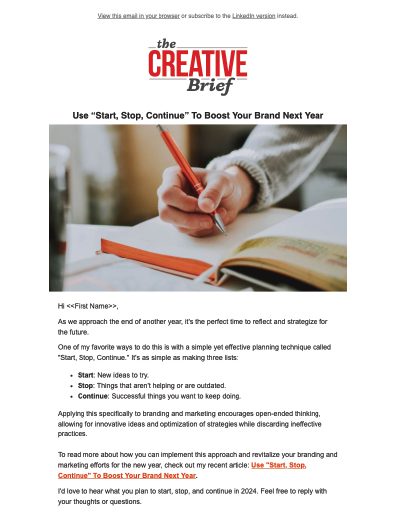If you are a small business or work for yourself as a consultant, you might think that branding isn’t for you. “Only big companies spend money on branding, small companies just get along by doing good work” is a typical response when small businesses are asked about their brand activities. But this perception is wrong, as I’ll explain here.
Even if you do believe in branding, it may come low on your to-do list after vital day-to-day tasks that keep your customers happy and keep revenue coming in. That’s understandable.
Why do small businesses need a brand?
So how do I convince you that branding matters – whether you are a consultant, landscaper, lawyer or run a restaurant?
I think maybe people get hung up on wording. If you were to replace the word “branding” with “reputation” instead, I think I might get your attention. You care about your reputation, right?
The thing is, you have a brand whether you like it or not. So you might as well embrace that and find the best way to connect your brand with your target audience.
Well, branding is all about the impression you make on others. If you want to succeed, that impression should do two things – it should convey what is unique about your business, and it should show you in a positive light.
Of course, many small businesses make a good impression most of the time without ever giving a thought to their brand. But think how much more successful you would be if you gave a good impression ALL of the time.
What I am suggesting is that you think about the reputation you want to have (your brand) and actively manage it.
There are two parts to doing this. First, you have to decide what you stand for – what is your unique value proposition – who your audience is, and how you want to position yourself to the market. Then, you need to make sure that all aspects of your business are aligned with this.
It’s about applying your values to everything you do, clearly and consistently. The thing is, you have a brand whether you like it or not. So you might as well embrace that and find the best way to connect your brand with your target audience.
Creating the right impression
But if you don’t think branding is for you, you are not alone.
Many small business owners, coaches, and consultants I meet think that brands are something that only large companies need or can afford. But your company name, the way you answer the phone, what your customers say when they’re asked about you – these things all build to create an impression of your company and what it’s like to do business with you – and that is your brand. So, your choice is to let whatever impression you give to the outside world happen on its own, or you can take control and manage it to your advantage.
If your brand values jibe with the values of your prospects, they will be more inclined to buy from you. Your foot is halfway through the door before they have even met you.
Your brand may be just as important to your relationships with partners and suppliers as it is to your customers. A strong brand could boost traffic to your website, and close the sales cycle sooner. And if your brand values jibe with the values of your prospects, they will be more inclined to buy from you. Your foot is halfway through the door before they have even met you.
Branding doesn’t need Nike-sized budgets. It takes passion and time and thought. But you neglect your brand at your peril. Businesses don’t own their own brand, they are custodians of it. Perceptions can alter quickly. Brands are continually evolving, and they need a lot of tending.
The takeaway is clear. If you’ve got a business, then you’ve got a brand. What you do with it is up to you.




